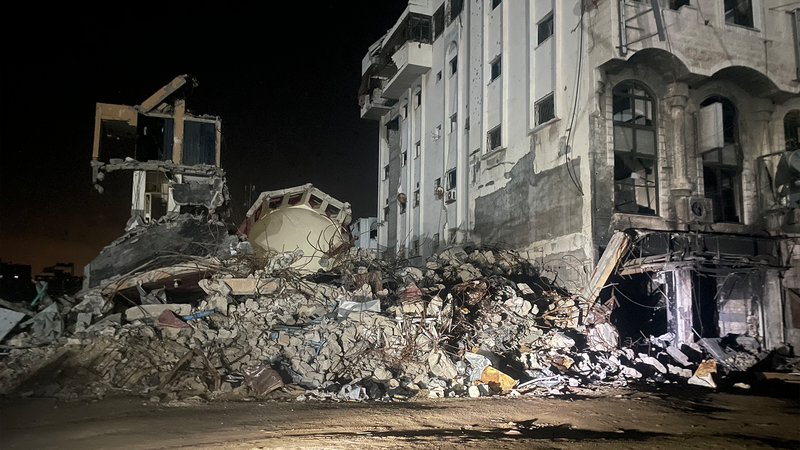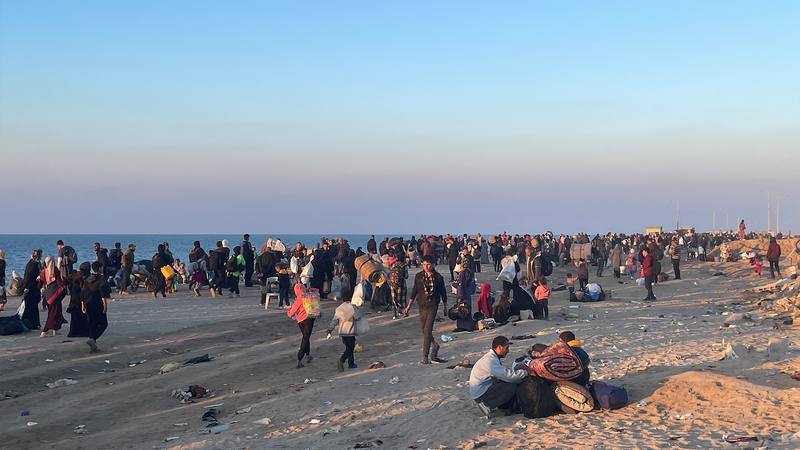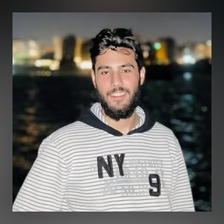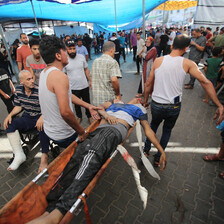The Electronic Intifada 21 February 2025

The only sources of light on my walk north from Deir al-Balah were the floodlights set up along the way.
The night before the ceasefire was announced, I couldn’t sleep. I was so excited I could barely close my eyes.
We all knew the ceasefire was coming; in the month prior, December 2024, the media had been filled with reports stating as much. And I knew that as soon as the ceasefire was announced I would head back home to northern Gaza.
I’d been living in a tent in Deir al-Balah, central Gaza, since 13 October 2023. My family and I were forced to leave our home in Gaza City – an apartment on the sixth floor of al-Wihda Tower in the Nasr neighborhood – due to constant and deadly Israeli attacks.
I was eager to get home and see what could be salvaged.
On Sunday, 19 January, I called my friend Nafez at 7 am, eager to start our walk north. He told me that there was no rush.
“We will get ready when the road opens,” he said. “It has not been opened yet.”
I spent all day in the tent, nervously waiting for the road north to be opened. That day I didn’t even eat. And the waiting was in vain; the occupation did not open the road that day.
On Monday, I again called Nafez and told him I was ready. But he had already left – he had to head north even earlier to help his brother-in-law and family with their bags.
It seemed like I would have to make the trip alone.
“Look at what the war has done to us”
I set off around 4 pm and headed to al-Rashid Street, to the Nwiri Hill, a high spot in the Nuseirat camp. Before the ceasefire, this hill was the farthest we could go north.
The crowds were massive on the hill, with everyone on foot and moving north. I followed the crowds north, with no direct route in mind.
Destruction was omnipresent the entire way. We walked through al-Zahra city, a place I’d been countless times before; but I couldn’t recognize it all, with the buildings and their facades crumbling into the street. I only realized where we were when I asked someone.
At around 5 pm, I took a minute to rest and ate some bread and drank some water. I was lucky to have these things, as many people endured the journey with barely anything to eat. I estimated I had about four hours to go until I reached our neighborhood.
My cousin Abdul Rahman had said he would try to meet me at the crossroads between the south and the north; but he never made it – the crowds were too large for him to get through.

Immediately after the ceasefire was announced, crowds in Deir al-Balah gathered to head home to northern Gaza.
It was getting dark and, with no electricity in Gaza, it was hard to see the path. The only sources of light were the large floodlights set up along the way. The bright lights shone on destroyed buildings and along muddy alleys, serving only to emphasize the vast swaths of darkness that surrounded us.
My phone rang. It was my friend Muhammad, who had stayed in the north during this genocidal war. He urged me to come and spend the night at our friend Karim’s house. Karim had also come from the south and was relieved to find his house still standing.
It was 9 pm and I was glad to rest. I was overjoyed to see Muhammad and Karim; we hugged and cried at our reunion.
“Look at what the war has done to us,” Muhammad said. “We used to see each other every day, and now, because of it, we haven’t met in over a year and a half!”
Karim and I were exhausted from the long walk, and it was only an hour before we all fell asleep.
What I found in my home
I slept deeply. When I woke up around 9 am, I ate a quick breakfast and headed directly to our home in al-Wihda Tower.
I had already seen photos of our building, so I knew of its current wrecked state. But those photos couldn’t prepare me for what I saw. The building’s walls were filled with gaping holes and other scars from the Israeli shellings and bombings.
The stairwell was full of rubble, and the stairs themselves were in rough shape – climbing them was like climbing a mountain. I climbed up to the sixth floor and along the way glanced into the apartments below us, which had been completely obliterated by occupation forces.
Our door had been barricaded a while ago, after our uncle had checked on our apartment and let us know that some of our belongings had been taken. I pried open the door with a hammer and pushed it open.
My heart pounded, and I prayed that our apartment was in better shape than those below us.
Our walls were mostly intact, except for holes and cracks throughout. In the middle of the floor, though, there was a large hole. Although the apartment was still standing, it was far from livable.
Our furniture remained, but not much else. Clothing was torn and covered in dust. All of our shoes were missing. I found my computer keyboard and mouse, but the monitors were gone. The kitchen and bathroom, in the interior of the home, were just as we had left them – except that the mirrors and other glass had shattered from the bombardments.
I did find a copy of the key to the home. I took it with me, as a memory of the life I once had there.
Visiting our friend’s grave
The next day we walked around the area.
Muhammad, Karim and I went to the Sheikh Radwan graveyard. We visited the grave of our friend Abdallah al-Khaldi, who was killed by the Israeli occupation.
We stood there for half an hour, whispering prayers for Abdallah, knowing he was in a better place.
We then visited another somber site – our university. Again, the photos I had seen couldn’t convey the extent of the destruction the occupation had leveled on the Islamic University of Gaza. I barely recognized the remaining shells of buildings. Like all the other places I once loved, it had been completely wiped out.
The buildings where I studied English literature; the field where I played football with my friends; the cafeteria where we hung out – only hills of sand and rubble remained.
I had known that I would find only destruction in the north, but it is important to return. Even though everything I once knew was in ruins, it still felt comforting to be in those places again.
I stayed in the north for 10 days and then went back to Deir al-Balah. My family and I will stay here until my father’s work contract expires, and then we will return north again. But I plan to return even sooner, to visit friends and to remember.
Khaled Al-Qershali is a writer and translator.





